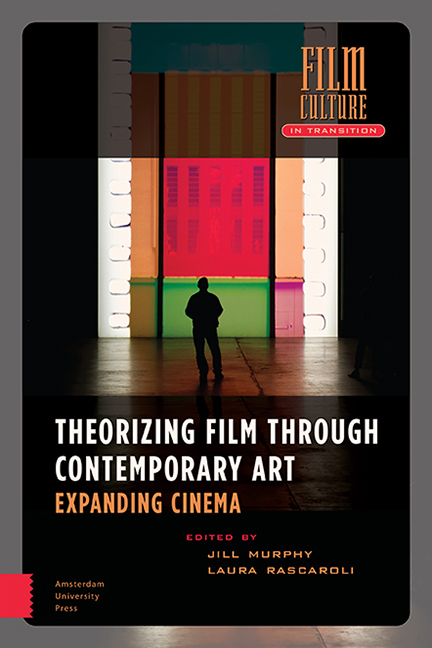Book contents
- Frontmater
- Dedication
- Contents
- List of Illustrations
- Acknowledgments
- Foreword: Courtesy of the Artists
- Introduction: On Cinema Expanding
- Part One Materialities
- 1 Cinema as (In)Visible Object; Looking, Making, and Remaking
- 2 Objects in Time; Artefacts in Artists’ Moving Image
- 3 Materializing the Body of the Actor; Labour, Memory, and Storage
- 4 How to Spell ‘Film’; Gibson + Recoder’s Alphabet of Projection
- Part Two Immaterialities
- 5 The Magic of Shadows; Distancing and Exposure in William Kentridge’s More Sweetly Play the Dance
- 6 Douglas Gordon and the Gallery of the Mind
- 7 A Throw of the Dice Will Never Abolish Chance; Tacita Dean’s Section Cinema (Homage to Marcel Broodthaers)
- Part Three Temporalities
- 8 The Photo-Filmic Diorama
- 9 The Cinematic Dispositif and Its Ghost; Sugimoto’s Theaters
- 10 Time/Frame: On Cinematic Duration
- Part Four The Futures of the Image
- 11 Interactivity without Control; David OReilly’s Everything (2017) and the Representation of Totality
- 12 Post-Cinematic Unframing
- 13 Absolute Immanence
- Index
6 - Douglas Gordon and the Gallery of the Mind
Published online by Cambridge University Press: 23 June 2021
- Frontmater
- Dedication
- Contents
- List of Illustrations
- Acknowledgments
- Foreword: Courtesy of the Artists
- Introduction: On Cinema Expanding
- Part One Materialities
- 1 Cinema as (In)Visible Object; Looking, Making, and Remaking
- 2 Objects in Time; Artefacts in Artists’ Moving Image
- 3 Materializing the Body of the Actor; Labour, Memory, and Storage
- 4 How to Spell ‘Film’; Gibson + Recoder’s Alphabet of Projection
- Part Two Immaterialities
- 5 The Magic of Shadows; Distancing and Exposure in William Kentridge’s More Sweetly Play the Dance
- 6 Douglas Gordon and the Gallery of the Mind
- 7 A Throw of the Dice Will Never Abolish Chance; Tacita Dean’s Section Cinema (Homage to Marcel Broodthaers)
- Part Three Temporalities
- 8 The Photo-Filmic Diorama
- 9 The Cinematic Dispositif and Its Ghost; Sugimoto’s Theaters
- 10 Time/Frame: On Cinematic Duration
- Part Four The Futures of the Image
- 11 Interactivity without Control; David OReilly’s Everything (2017) and the Representation of Totality
- 12 Post-Cinematic Unframing
- 13 Absolute Immanence
- Index
Summary
Abstract
Made in collaboration with Rufus Wainwright after the loss of his mother, Douglas Gordon's Phantom (2011) engages gallery-goers in an embodied perceptual experience of the darkness of grief, which is felt as well as seen. And yet the titular phantom points to what ghosts embodied vision, making space for images of the mind's eye. Lost love, mourned but also conjured back through memory, dream, or imagination, extends beyond the personal to include a bygone era of classical film. Phantom draws from and returns us to cinema, expanding the experience of the moving image through its insistence upon the importance of both what is present or visible in the gallery space and what exists in the liminal state of mental vision.
Keywords: Douglas Gordon, Phantom, perception, mental image, vision, blindness
‘When most I wink, then do mine eyes best see’
The blink of an eye is among the quickest of anatomical movements: the lids descend and rise without challenging the persistence of vision. Slow this motion down considerably, though, and that briefest of disruptions to visual perception becomes more remarkable. This is precisely what Douglas Gordon does in his installation Phantom (2011), which features a human eye, filmed in close-up and in extreme slow motion, looking out from a screen that bisects the stage on which it is positioned and illuminates the darkened room. The eye is at once familiar and strange: it is heavily kohl-rimmed with thick false lashes, moving but only just, appearing as a black oval that opens and closes within alabaster skin. Occasionally, a tear wells, swirls, and rolls around and down: the darkness of the eye and the room is that of intense sadness, which the plaintive music of a male voice and piano fuels and palliates. The voice and piano playing are those of musician Rufus Wainwright, Gordon's collaborator on this piece and the person to whom the made-up eye belongs. The music is from the album All Days are Nights, released after the death of his mother, and the sorrow is caused by grief. Wainwright borrows the album title from Shakespeare's ‘Sonnet 43’ in which days are nights in the absence of seeing his love, whereas nights become days when his love appears in his dreams.
- Type
- Chapter
- Information
- Theorizing Film Through Contemporary ArtExpanding Cinema, pp. 143 - 156Publisher: Amsterdam University PressPrint publication year: 2020



